Fleurs du Mal Magazine


Or see the index
Bejan Matur behoort tot de bekendste en bij literatuurliefhebbers meest gewaardeerde dichters in Turkije.
Bij de politieke overheid van haar land ligt dat anders. Maar ze heeft intussen internationale faam opgebouwd en leeft in wisselende landen in Europa. In 2002 trad ze op tijdens Poetry International in Rotterdam.
 Bejan Matur
Bejan Matur
Ceremoniële gewaden
Gedichten
Uitgever Kleinood & Grootzeer
Bundel
54 pagina’s
gelijmd
21 x 10,5 cm
ISBN/EAN 978-90-76644-89-9
€18,-
Eerste druk 100 genummerde door de auteur en de vertaler gesigneerde exemplaren
Vertaling en nawoord Willem M. Roggeman
Bejan Matur
Bejan Matur behoort tot de bekendste en bij literatuur-liefhebbers meest gewaardeerde dichters in Turkije. Bij de politieke overheid van haar land ligt dat anders. Maar zij heeft intussen ook een internationale faam opgebouwd. Haar poëzie werd in verscheidene talen vertaald en zelf wordt zij geregeld gevraagd als gast op internationale poëziefestivals. Zij publiceerde tot nog toe in Turkije tien werken, negen dichtbundels en een prozaboek dat als literaire journalistiek kan bestempeld worden.
 Dit boek, Dagin Ardina Bakmak (Kijken achter de berg), handelt over de Koerdische kwestie en verscheen in februari 2011. Er heerste toen in Turkije een nog rustige periode waarin er een vredesproces aan de gang was. Bejan Matur besloot over de PKK-guerilleros te schrijven. Zij trok hiervoor naar het gebied waar de Koerdische vrijheidsstrijders zich schuilhielden en zij had meerdere gesprekken met hen. Deze gesprekken dienden als basis voor dit nog steeds actuele boek over een volk zonder land. Dit boek werd onmiddellijk een bestseller. Er werden meer dan 50.000 exemplaren van verkocht en nadien werden er nog verscheidene clandestiene uitgaven van gemaakt.
Dit boek, Dagin Ardina Bakmak (Kijken achter de berg), handelt over de Koerdische kwestie en verscheen in februari 2011. Er heerste toen in Turkije een nog rustige periode waarin er een vredesproces aan de gang was. Bejan Matur besloot over de PKK-guerilleros te schrijven. Zij trok hiervoor naar het gebied waar de Koerdische vrijheidsstrijders zich schuilhielden en zij had meerdere gesprekken met hen. Deze gesprekken dienden als basis voor dit nog steeds actuele boek over een volk zonder land. Dit boek werd onmiddellijk een bestseller. Er werden meer dan 50.000 exemplaren van verkocht en nadien werden er nog verscheidene clandestiene uitgaven van gemaakt.
Maar sedert het vredesproces door de Turkse overheid werd opgeblazen kreeg Bejan Matur het bijzonder moeilijk, vooral omwille van deze reportage. Zij werd zelfs opgesloten in de gevangenis en werd er gefolterd om haar bronnen prijs te geven. In 2016 besloot zij dan ook het land te verlaten omdat zij zich bedreigd voelde bij al wat zij schreef. Niet alleen was er de mogelijkheid van een proces, maar er werden ook doodsbedreigingen geuit. Zij koos dan ook voor een vrijwillige ballingschap in Londen. Maar zij miste daar de mediterrane levenswijze. Daarom keerde zij in oktober 2017 toch terug naar Istanbul. Sedertdien verdeelt zij haar tijd tussen Istanbul, Londen, Athene en Verona.
Bejan Matur werd op 14 september 1968 geboren in een Koerdisch-Alevisch gezin in de oude Hitietenstad Kahramanmarash in het zuidoosten van Turkije, Koerdisch gebied. Zij studeerde aan het lyceum in de grotere stad Gaziantep en leefde toen samen met haar zusters ver van haar ouders. Haar vader wenste dat zij advocaat zou worden, of anders journalist.
Aan de universiteit van Ankara studeerde zij rechten, maar zij heeft nooit een advocatenpraktijk uitgeoefend. Zij werd diep getroffen door de onrechtvaardige behandeling van de Koerden en andere etnische minderheden in Turkije, wat steeds gebeurde onder het mom van de toepassing van de wet. Ook kwam zij tot de conclusie dat zij als advocaat alleen zou kunnen optreden als verdediger van de mensenrechten, maar dat zij hiervoor over weinig juridische mogelijkheden beschikte.
Al tientallen jaren heerst er een gewapend conflict tussen de Turkse staat en diverse Koerdische opstandige groeperingen. De Koerden verklaren dat zij vrijheidsstrijders zijn tegen de vreemde bezetters van hun land terwijl de Turkse staat hen bestempeld als terroristen en separatisten. Zelf was Bejan Matur tien jaar toen zij in 1978 getuige was van een pogrom op de Alevis in haar geboortestad. De vraag “Waarom doden zij ons?” heeft deze dichteres sedertdien nooit meer verlaten. Dit werd de beladen thematiek van de poëzie van Bejan Matur. In haar gedichten is vaak sprake van pijn, bloed en leed. Gelukkig laat ze zich nooit verleiden tot het schrijven van politiek geëngageerde gedichten, wat haar poëzie immers tijdgebonden en al gauw verouderd zou maken. Bovendien verafschuwt zij de slachtofferrol en streeft zij daarom eerder naar het scheppen van een ruimte om te dromen, een ruimte voor de artistieke creatie, voor hoop en liefde.
Hoewel zij nooit advocaat werd, brengt Bejan Matur als auteur, zowel in haar gedichten als in artikelen, toch een pleidooi voor de mensenrechten in het algemeen, maar ook voor de rechten van de vrouw en de bescherming van andere bedreigde groepen in de samenleving. Reeds tijdens haar studies publiceerde zij poëzie in diverse tijdschriften. Haar gedichten werden toen als “duister en mystiek” bestempeld. Zij schrijft haar gedichten in het Turks, maar de gevoelswaarde en het ritme van de Koerdische taal zijn erin te herkennen.
Vaak wordt god genoemd in deze gedichten, maar steeds volledig met kleine letters geschreven. Men moet de naam god dan ook niet zo zeer lezen in religieuze zin, maar eerder als een zinnebeeld voor het menselijk hart dat verlangt naar vrede, vrijheid en liefde voor de medemens. Dit wordt vooral duidelijk in het gedicht “Ceremoniële gewaden” waar zij schrijft: Misschien is geschiedenis een vergissing, zegt de dichter. De mens zelf is een vergissing, zegt god.
Haar eerste dichtbundel Rüzgar Dolu Konaklar (De wind huilt tussen de herenhuizen) verscheen in 1996 en stond volledig buiten de heersende trend in de Turkse poëzie. Deze sjamanistische poëzie met haar heidense beelden hoorde eerder bij het verleden dan bij het heden. Precies hierdoor trok hij sterk de aandacht. Voor deze bundel kreeg Bejan Matur zelfs verscheidene prijzen.
Haar tweede bundel, Tanri Görmesin Harflerini (God moet mijn handgeschreven brief niet zien) verscheen in 1999 en werd eveneens gunstig onthaald. In 2002 verschenen tegelijkertijd twee bundels, Ayin Büyüttügü Ogüllar (Zonen opgevoed door de maan) en Onün çölünde (In zijn woestijn).
De poëzie van Bejan Matur werd reeds in meer dan twintig talen vertaald, maar er verscheen nauwelijks iets in het Nederlands. Wel trad zij in juni 2002 op tijdens het internationaal poëziefestival Poetry International in Rotterdam. Naar aanleiding hiervan verschenen twee gedichten in Nederlandse vertaling door Ireneus Spit in de bloemlezing “Hotel Parnassus”, uitgegeven door De Arbeiderspers in Amsterdam.
In Engeland verscheen in 2003 de bundel In the Temple of a Patient God en bij de uitgeverij Phi in Luxemburg verscheen een Duitse en een Franse bundel.
Bejan Matur wordt geregeld gevraagd om op te treden in het buitenland. Zo leerde ik haar persoonlijk kennen op het internationaal poëziefestival dat in september 2008 in Tel Aviv werd gehouden.
Haar vijfde dichtbundel Ibrahim’in Beni Terketmesi (Abraham verlaat ons) verscheen in maart 2008 en werd door de critici ontvangen als haar voorlopig beste werk. De beeldvorming in dit werk werd ook weer als mystiek beschreven. De dichteres heeft inderdaad een persoonlijke ontologie gecreëerd, die steunt op de Soefi-traditie, die meer dan duizend jaar oud is. In 2009 verscheen Dogunun Kapisi: Diyarbakir (De Poort van het Oosten: Diyarbakir) en een jaar later publiceerde Bejan Matur Kader Denizi (Zee van Geloof), gedichten bij foto’s van Mehmet Günyeli. Deze foto’s waren eerder te zien op tentoonstellingen in prestigieuze galerieën in Istanbul en Ankara.
Vanaf 2005 schreef Bejan Matur geregeld artikelen in het Turkse dagblad Zaman, maar in 2012 werd zij ontslagen. Zij werkte af en toe mee aan het Engelstalige dagblad Today’s Zaman. Zij schreef hoofdzakelijk artikelen over de situatie van de Koerden, maar ook over het problematisch bestaan van de Armeniërs, over actuele politieke gebeurtenissen, minderheidsgroepen, gevangenis-literatuur en de onderdrukking van de vrouw.
Thans werkt zij aan geen enkele krant meer mee.
In haar laatste twee bundels, Son Dag (De laatste berg, 2015) en Ask Olmayan (Liefdesgedichten, 2016) vindt men de typische Koerdische levenssfeer terug in de talrijke natuurbeschrijvingen en in de weergave van de landschappen van Koerdistan, binnen en buiten de grenzen van Turkije. De bergen, de rivieren, de maan, de zon en de plantengroei komen steeds weer in deze verzen voor en bepalen mee het ritme van haar zeggings-wijze, die echter vooral door de wind wordt gedragen. Het valt dan ook onmiddellijk op dat de wind als symbool een primaire rol speelt in deze gedichten. Met haar talrijke allusies op elementen uit de eeuwenoude Koerdische cultuur neemt Bejan Matur een unieke en heel aparte plaats in de hedendaagse Turkse poëzie in.
Willem M. Roggeman
11 maart 2019
Uitgeverij Kleinood & Grootzeer
Kon. Wilhelminastraat 46
4615 JB Bergen op Zoom NL
T: 0164 24 00 49 (0031 164 24 00 49)
email: uitgeverij@kleinood-en-grootzeer.com
website: http://kleinood-en-grootzeer.com/index.html
• fleursdumal.nl magazine
More in: #Editors Choice Archiv, - Book News, - Book Stories, Archive M-N, Archive M-N, Archive Q-R, Art & Literature News, REPRESSION OF WRITERS, JOURNALISTS & ARTISTS, TRANSLATION ARCHIVE
OLD ABE’S CONVERSION
The Negro population of the little Southern town of Danvers was in a state of excitement such as it seldom reached except at revivals, baptisms, or on Emancipation Day. The cause of the commotion was the anticipated return of the Rev. Abram Dixon’s only son, Robert, who, having taken up his father’s life-work and graduated at one of the schools, had been called to a city church.
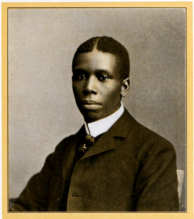 When Robert’s ambition to take a college course first became the subject of the village gossip, some said that it was an attempt to force Providence. If Robert were called to preach, they said, he would be endowed with the power from on high, and no intervention of the schools was necessary. Abram Dixon himself had at first rather leaned to this side of the case. He had expressed his firm belief in the theory that if you opened your mouth, the Lord would fill it. As for him, he had no thought of what he should say to his people when he rose to speak. He trusted to the inspiration of the moment, and dashed blindly into speech, coherent or otherwise.
When Robert’s ambition to take a college course first became the subject of the village gossip, some said that it was an attempt to force Providence. If Robert were called to preach, they said, he would be endowed with the power from on high, and no intervention of the schools was necessary. Abram Dixon himself had at first rather leaned to this side of the case. He had expressed his firm belief in the theory that if you opened your mouth, the Lord would fill it. As for him, he had no thought of what he should say to his people when he rose to speak. He trusted to the inspiration of the moment, and dashed blindly into speech, coherent or otherwise.
Himself a plantation exhorter of the ancient type, he had known no school except the fields where he had ploughed and sowed, the woods and the overhanging sky. He had sat under no teacher except the birds and the trees and the winds of heaven. If he did not fail utterly, if his labour was not without fruit, it was because he lived close to nature, and so, near to nature’s God. With him religion was a matter of emotion, and he relied for his results more upon a command of feeling than upon an appeal to reason. So it was not strange that he should look upon his son’s determination to learn to be a preacher as unjustified by the real demands of the ministry.
But as the boy had a will of his own and his father a boundless pride in him, the day came when, despite wagging heads, Robert Dixon went away to be enrolled among the students of a growing college. Since then six years had passed. Robert had spent his school vacations in teaching; and now, for the first time, he was coming home, a full-fledged minister of the gospel.
It was rather a shock to the old man’s sensibilities that his son’s congregation should give him a vacation, and that the young minister should accept; but he consented to regard it as of the new order of things, and was glad that he was to have his boy with him again, although he murmured to himself, as he read his son’s letter through his bone-bowed spectacles: “Vacation, vacation, an’ I wonder ef he reckons de devil’s goin’ to take one at de same time?”
It was a joyous meeting between father and son. The old man held his boy off and looked at him with proud eyes.
“Why, Robbie,” he said, “you—you’s a man!”
“That’s what I’m trying to be, father.” The young man’s voice was deep, and comported well with his fine chest and broad shoulders.
“You’s a bigger man den yo’ father ever was!” said his mother admiringly.
“Oh, well, father never had the advantage of playing football.”
The father turned on him aghast. “Playin’ football!” he exclaimed. “You don’t mean to tell me dat dey ‘lowed men learnin’ to be preachers to play sich games?”
“Oh, yes, they believe in a sound mind in a sound body, and one seems to be as necessary as the other in fighting evil.”
Abram Dixon shook his head solemnly. The world was turning upside down for him.
“Football!” he muttered, as they sat down to supper.
Robert was sorry that he had spoken of the game, because he saw that it grieved his father. He had come intending to avoid rather than to combat his parent’s prejudices. There was no condescension in his thought of them and their ways. They were different; that was all. He had learned new ways. They had retained the old. Even to himself he did not say, “But my way is the better one.”
His father was very full of eager curiosity as to his son’s conduct of his church, and the son was equally glad to talk of his work, for his whole soul was in it.
“We do a good deal in the way of charity work among the churchless and almost homeless city children; and, father, it would do your heart good if you could only see the little ones gathered together learning the first principles of decent living.”
“Mebbe so,” replied the father doubtfully, “but what you doin’ in de way of teachin’ dem to die decent?”
The son hesitated for a moment, and then he answered gently, “We think that one is the companion of the other, and that the best way to prepare them for the future is to keep them clean and good in the present.”
“Do you give ’em good strong doctern, er do you give ’em milk and water?”
“I try to tell them the truth as I see it and believe it. I try to hold up before them the right and the good and the clean and beautiful.”
“Humph!” exclaimed the old man, and a look of suspicion flashed across his dusky face. “I want you to preach fer me Sunday.”
It was as if he had said, “I have no faith in your style of preaching the gospel. I am going to put you to the test.”
Robert faltered. He knew his preaching would not please his father or his people, and he shrank from the ordeal. It seemed like setting them all at defiance and attempting to enforce his ideas over their own. Then a perception of his cowardice struck him, and he threw off the feeling that was possessing him. He looked up to find his father watching him keenly, and he remembered that he had not yet answered.
“I had not thought of preaching here,” he said, “but I will relieve you if you wish it.”
“De folks will want to hyeah you an’ see what you kin do,” pursued his father tactlessly. “You know dey was a lot of ’em dat said I oughn’t ha’ let you go away to school. I hope you’ll silence ’em.”
Robert thought of the opposition his father’s friends had shown to his ambitions, and his face grew hot at the memory. He felt his entire inability to please them now.
“I don’t know, father, that I can silence those who opposed my going away or even please those who didn’t, but I shall try to please One.”
It was now Thursday evening, and he had until Saturday night to prepare his sermon. He knew Danvers, and remembered what a chill fell on its congregations, white or black, when a preacher appeared before them with a manuscript or notes. So, out of concession to their prejudices, he decided not to write his sermon, but to go through it carefully and get it well in hand. His work was often interfered with by the frequent summons to see old friends who stayed long, not talking much, but looking at him with some awe and a good deal of contempt. His trial was a little sorer than he had expected, but he bore it all with the good-natured philosophy which his school life and work in a city had taught him.
The Sunday dawned, a beautiful, Southern summer morning; the lazy hum of the bees and the scent of wild honeysuckle were in the air; the Sabbath was full of the quiet and peace of God; and yet the congregation which filled the little chapel at Danvers came with restless and turbulent hearts, and their faces said plainly: “Rob Dixon, we have not come here to listen to God’s word. We have come here to put you on trial. Do you hear? On trial.”
And the thought, “On trial,” was ringing in the young minister’s mind as he rose to speak to them. His sermon was a very quiet, practical one; a sermon that sought to bring religion before them as a matter of every-day life. It was altogether different from the torrent of speech that usually flowed from that pulpit. The people grew restless under this spiritual reserve. They wanted something to sanction, something to shout for, and here was this man talking to them as simply and quietly as if he were not in church.
As Uncle Isham Jones said, “De man never fetched an amen”; and the people resented his ineffectiveness. Even Robert’s father sat with his head bowed in his hands, broken and ashamed of his son; and when, without a flourish, the preacher sat down, after talking twenty-two minutes by the clock, a shiver of surprise ran over the whole church. His father had never pounded the desk for less than an hour.
Disappointment, even disgust, was written on every face. The singing was spiritless, and as the people filed out of church and gathered in knots about the door, the old-time head-shaking was resumed, and the comments were many and unfavourable.
“Dat’s what his schoolin’ done fo’ him,” said one.
“It wasn’t nothin’ mo’n a lecter,” was another’s criticism.
“Put him ‘side o’ his father,” said one of the Rev. Abram Dixon’s loyal members, “and bless my soul, de ol’ man would preach all roun’ him, and he ain’t been to no college, neither!”
Robert and his father walked home in silence together. When they were in the house, the old man turned to his son and said:
“Is dat de way dey teach you to preach at college?”
“I followed my instructions as nearly as possible, father.”
“Well, Lawd he’p dey preachin’, den! Why, befo’ I’d ha’ been in dat pulpit five minutes, I’d ha’ had dem people moanin’ an’ hollerin’ all over de church.”
“And would they have lived any more cleanly the next day?”
The old man looked at his son sadly, and shook his head as at one of the unenlightened.
Robert did not preach in his father’s church again before his visit came to a close; but before going he said, “I want you to promise me you’ll come up and visit me, father. I want you to see the work I am trying to do. I don’t say that my way is best or that my work is a higher work, but I do want you to see that I am in earnest.”
“I ain’t doubtin’ you mean well, Robbie,” said his father, “but I guess I’d be a good deal out o’ place up thaih.”
“No, you wouldn’t, father. You come up and see me. Promise me.”
And the old man promised.
It was not, however, until nearly a year later that the Rev. Abram Dixon went up to visit his son’s church. Robert met him at the station, and took him to the little parsonage which the young clergyman’s people had provided for him. It was a very simple place, and an aged woman served the young man as cook and caretaker; but Abram Dixon was astonished at what seemed to him both vainglory and extravagance.
“Ain’t you livin’ kin’ o’ high fo’ yo’ raisin’, Robbie?” he asked.
The young man laughed. “If you’d see how some of the people live here, father, you’d hardly say so.”
Abram looked at the chintz-covered sofa and shook his head at its luxury, but Robert, on coming back after a brief absence, found his father sound asleep upon the comfortable lounge.
On the next day they went out together to see something of the city. By the habit of years, Abram Dixon was an early riser, and his son was like him; so they were abroad somewhat before business was astir in the town. They walked through the commercial portion and down along the wharves and levees. On every side the same sight assailed their eyes: black boys of all ages and sizes, the waifs and strays of the city, lay stretched here and there on the wharves or curled on doorsills, stealing what sleep they could before the relentless day should drive them forth to beg a pittance for subsistence.
“Such as these we try to get into our flock and do something for,” said Robert.
His father looked on sympathetically, and yet hardly with full understanding. There was poverty in his own little village, yes, even squalour, but he had never seen anything just like this. At home almost everyone found some open door, and rare was the wanderer who slept out-of-doors except from choice.
At nine o’clock they went to the police court, and the old minister saw many of his race appear as prisoners, receiving brief attention and long sentences. Finally a boy was arraigned for theft. He was a little, wobegone fellow hardly ten years of age. He was charged with stealing cakes from a bakery. The judge was about to deal with him as quickly as with the others, and Abram’s heart bled for the child, when he saw a negro call the judge’s attention. He turned to find that Robert had left his side. There was a whispered consultation, and then the old preacher heard with joy, “As this is his first offence and a trustworthy person comes forward to take charge of him, sentence upon the prisoner will be suspended.”
Robert came back to his father holding the boy by the hand, and together they made their way from the crowded room.
“I’m so glad! I’m so glad!” said the old man brokenly.
“We often have to do this. We try to save them from the first contact with the prison and all that it means. There is no reformatory for black boys here, and they may not go to the institutions for the white; so for the slightest offence they are sent to jail, where they are placed with the most hardened criminals. When released they are branded forever, and their course is usually downward.”
He spoke in a low voice, that what he said might not reach the ears of the little ragamuffin who trudged by his side.
Abram looked down on the child with a sympathetic heart.
“What made you steal dem cakes?” he asked kindly.
“I was hongry,” was the simple reply.
The old man said no more until he had reached the parsonage, and then when he saw how the little fellow ate and how tenderly his son ministered to him, he murmured to himself, “Feed my lambs”; and then turning to his son, he said, “Robbie, dey’s some’p’n in ‘dis, dey’s some’p’n in it, I tell you.”
That night there was a boy’s class in the lower room of Robert Dixon’s little church. Boys of all sorts and conditions were there, and Abram listened as his son told them the old, sweet stories in the simplest possible manner and talked to them in his cheery, practical way. The old preacher looked into the eyes of the street gamins about him, and he began to wonder. Some of them were fierce, unruly-looking youngsters, inclined to meanness and rowdyism, but one and all, they seemed under the spell of their leader’s voice. At last Robert said, “Boys, this is my father. He’s a preacher, too. I want you to come up and shake hands with him.” Then they crowded round the old man readily and heartily, and when they were outside the church, he heard them pause for a moment, and then three rousing cheers rang out with the vociferated explanation, “Fo’ de minister’s pap!”
Abram held his son’s hand long that night, and looked with tear-dimmed eyes at the boy.
“I didn’t understan’,” he said. “I didn’t understan’.”
“You’ll preach for me Sunday, father?”
“I wouldn’t daih, honey. I wouldn’t daih.”
“Oh, yes, you will, pap.”
He had not used the word for a long time, and at sound of it his father yielded.
It was a strange service that Sunday morning. The son introduced the father, and the father, looking at his son, who seemed so short a time ago unlearned in the ways of the world, gave as his text, “A little child shall lead them.”
He spoke of his own conceit and vainglory, the pride of his age and experience, and then he told of the lesson he had learned. “Why, people,” he said, “I feels like a new convert!”
It was a gentler gospel than he had ever preached before, and in the congregation there were many eyes as wet as his own.
“Robbie,” he said, when the service was over, “I believe I had to come up here to be converted.” And Robbie smiled.
Paul Laurence Dunbar
(1872 – 1906)
Old Abe’s Conversion
From The Heart Of Happy Hollow, a collection of short stories reprinted in 1904 by Dodd, Mead and Company, New York.
Short Story
• fleursdumal.nl magazine
More in: Archive C-D, Archive C-D, Dunbar, Paul Laurence, Dunbar, Paul Laurence, Paul Laurence Dunbar, Paul Laurence Dunbar
Geliefden Hanna en Loek besluiten samen een scenario te schrijven. Een liefdesverhaal moet het worden, de personages moeten elkaar krijgen. Maar niet op een clichématige manier.
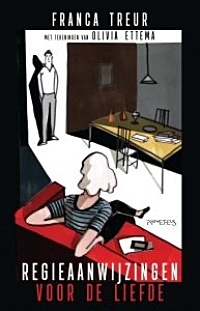 Intussen wordt het steeds benauwder in de huiskamer. Al snel gaan de ramen open en komt de buitenwereld binnen. Aan de ene kant brengt dat lucht, aan de andere kant verleiding.
Intussen wordt het steeds benauwder in de huiskamer. Al snel gaan de ramen open en komt de buitenwereld binnen. Aan de ene kant brengt dat lucht, aan de andere kant verleiding.
Bestaat de veilige cocon nog of heeft de globalisering automatisch ieders wereld groter gemaakt? Welke concessies doet een filmmaker? Hoe flexibel zijn principes? Kun je de redder in nood zijn van je ex?
In vijftig korte hoofdstukken en vijftig tekeningen wordt het moderne leven gefileerd, met bijzondere aandacht voor de liefdesrelatie. Is het moment dat de personages elkaar krijgen het moment waarop Loek en Hanna elkaar verliezen?
Franca Treur debuteerde in 2009 met de roman Dorsvloer vol confetti, waarvan meer dan 150.000 exemplaren werden verkocht. Het was het meest bejubelde literaire debuut in jaren. Het boek won verschillende prijzen en het werd verfilmd. In 2014 verscheen haar tweede roman, De woongroep, en in 2015 het Zeeuwse Boekenweekgeschenk Ik zou maar nergens op rekenen. Daarnaast schrijft ze verhalen, essays en columns voor uiteenlopende media.
Franca Treur
Regieaanwijzingen voor de liefde
Gebonden
216 p.
Druk 1
Verschenen 08-02-19
Uitgever Prometheus
Nederlandse fictie
ISBN 9789044640441
€ 19,99
# new fiction
franca treur
regieaanwijzingen voor de liefde
• fleursdumal.nl magazine
More in: - Book News, - Bookstores, Archive S-T, Art & Literature News, Franca Treur
Joni Mitchell: New Critical Readings recognizes the importance and innovativeness of the musician and artist Joni Mitchell and the need for a collection that theorizes her work as musician, composer, cultural commentator and antagonist.
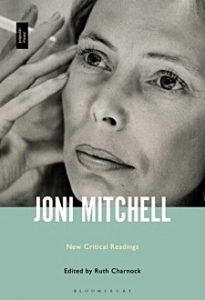 It showcases pieces by established and early career academics from the fields of popular music and literary studies on subjects such as Mitchell’s guitar technique, the politics of aging in her work, and her fractious relationship with feminism.
It showcases pieces by established and early career academics from the fields of popular music and literary studies on subjects such as Mitchell’s guitar technique, the politics of aging in her work, and her fractious relationship with feminism.
The collection features close readings of specific songs, albums, and performances while also paying keen attention to Mitchell’s wider cultural contributions and significance.
About the Author: Ruth Charnock is Senior Lecturer in English at the University of Lincoln, UK. She is the author of Anaïs Nin: Bad Sex, Shame and Contemporary Culture (forthcoming, 2019) and various articles and essays on Joni Mitchell, Marvin Gaye, Anaïs Nin, contemporary American literature, and popular culture.
Joni Mitchell
New Critical Readings
Editor: Ruth Charnock
Published: 24-01-2019
Format: Hardback
Edition: 1st
248 pages
Illustrations: 2 bw illus
Dimensions: 229 x 152 mm
Publisher: Bloomsbury Academic
Language: English
ISBN-10: 1501332090
ISBN-13: 978-1501332098
£86.40
# new books
joni mitchell
new critical readings
• fleursdumal.nl magazine
More in: - Book News, - Bookstores, Archive C-D, Archive M-N, Archive M-N, Art & Literature News, Joni Mitchell
Quelle force de vérité accorder à la poésie? Apparemment aucune selon Baudelaire.
 C’est pourtant lui qui assure le passage décisif vers une poésie qui remet en question ses fondements, son devenir, sa nécessité, une poésie qui exige d’être sans cesse perception à valeur existentielle.
C’est pourtant lui qui assure le passage décisif vers une poésie qui remet en question ses fondements, son devenir, sa nécessité, une poésie qui exige d’être sans cesse perception à valeur existentielle.
La réflexivité poétique qui s’exerce entre apparence et tréfonds de l’homme exacerbe le poétique et le menace. Où, quand, comment et vers quoi se joue le vrai du poème ?
Pourquoi cette oeuvre pose-t-elle les enjeux de la modernité ?
Se débattant contre tout Idéal absolu, la poétique baudelairienne désire la liberté incarnée et douloureuse de l’artiste, de l’humain.
Régine Foloppe, est l’auteur de plusieurs recueils poétiques, notamment : Tributaires du vent (Le Castor Astral, prix Max-Pol Fouchet) et Famines (Belin). Elle a publié des articles et des poèmes dans des revues (PO&SIE, Eidôlon, Friches, Diérèse…). Agrégée de lettres modernes, docteure en littérature française, elle enseigne à l’Université de Montpellier.
Baudelaire et la vérité poétique
Auteur: Régine Foloppe
Editeur : Editions L’Harmattan
Collection : La philosophie en commun
19 février 2019
Format : 15,5 x 24 cm
Broché
464 pages
Langue : Français
ISBN-10: 2343157642
ISBN-13: 978-2343157641
EUR 42,00
• fleursdumal.nl magazine
More in: - Book News, - Bookstores, Archive A-B, Archive A-B, Archive E-F, Art & Literature News, Baudelaire, Baudelaire, Charles
Onias Landveld Stadsdichter van Tilburg organiseert op 30 maart, de tweede editie van The Stage. Die avond zal hij met zijn podium te gast zijn bij het Tilt Festival in Theater De Nieuwe Vorst in Tilburg.
 Het thema van de avond is “Zij is”, een knik naar de Boekenweek 2019, die ‘Moeder de vrouw’ als onderwerp heeft.
Het thema van de avond is “Zij is”, een knik naar de Boekenweek 2019, die ‘Moeder de vrouw’ als onderwerp heeft.
Met een aantal speciale gasten zal The Stage bezoekers die avond vermaken met poëzie, verhalen en muziek.
De stadsdichter is het podium gestart omdat hij iets wil achterlaten als hij in Augustus dit jaar afzwaait.
Onias Landveld vindt dat woordkunst in een stad als Tilburg een plaats moet blijven hebben. Daarom is hij vorig jaar dit evenement gestart dat zijn vaste plek in de Nwe Vorst heeft.
Op 30 maart staan on Stage: Zeinab El Bouni, Aminata Cairo, LouLou Elisabettie, Lev Avitan, Whitney Muanza Sabina Lukovic en Tessa Gabriëls.
Onias Landveld & The Stage
Tilt Festival in Theater De Nieuwe Vorst
Willem II straat – Tilburg.
Aanvang: 20:45
Einde: 22:45
Kaarten verkrijgbaar via de website van Tilt of de Nieuwe Vorst
# website theater de nieuwe vorst

• fleursdumal.nl magazine
More in: *Concrete + Visual Poetry K-O, - Book Lovers, Archive K-L, Archive K-L, Art & Literature News, City Poets / Stadsdichters, Landveld, Onias, STREET POETRY, THEATRE, Tilt Festival Tilburg
`Wat een allemachtig mooie bliksem’, zegt Tijger vol bewondering. Het hele dorp wordt geraakt door vuurpijlen die sissend in de grond slaan.
 `Onweer is sprookjesweer’, zegt Thija.
`Onweer is sprookjesweer’, zegt Thija.
Door het raampje van de zolder is het uitzicht op de wereld altijd sprookjesachtig, maar vooral nu, nu de bliksem het dorp wil afbranden en de donkere bossen aan de bovenloop van de Wijer in een witte gloed zet.
In hun bijna geluiddichte schuilplaats op de zolder van de molen horen ze het onweer nauwelijks, maar zien ze wel de bliksem wanneer die als een drietand boven het dorp staat. Hij vonkt langs de bliksemafleider van de kerk. De vlammen spatten van het beeld van Christoffel dat boven op de toren staat en die het dorp bewaakt, met op zijn schouder het kindje Jezus dat al een paar honderd jaar wacht om over de Wijer te worden gedragen.
Thija leest voor uit een van de bijbelboeken die in een doos op de zolder staan. Ze hebben er pas twee gelezen. De rest moet nog.
`Zodra Izebel, de weduwe van koning Achab van Juda, hoorde dat Jehoe, de nieuwe koning van Juda en moordenaar van haar man, haar kwam bezoeken, liet zij haar huis beschilderen, plantte bloemen in haar tuin en nodigde vrouwen in haar huis.’
`Dat zijn veel komma’s in één zin’, zegt Mels.
`Ik kan niet anders lezen dan dat wat er staat’, zegt Thija. Ze leest verder.
`Deze vrouwen waren in de hogere kringen zeer geliefd. Zij verstonden de kunst van het verleiden en maakten daar gebruik van.’
`Hoeren dus’, zegt Tijger. `Net als in de bunker.’
`Op de dag van Jehoes aankomst, verfde Izebel haar ogen zwart, haar lippen rood en haar nagels paars.’ Thija doet een vinger op haar lippen om te voorkomen dat Tijger daar weer opmerkingen over maakt. `Ze maakte haar kapsel in orde, kleedde zich in een jurk van doorschijnende zijde, sierde zich met paarlen, robijnen en blauw glanzende brokken aquamarijn. Daarna ging ze op het met bloemen gestikte kussen voor het venster zitten en wachtte af. Toen ze Jehoe zag naderen, raakte ze zeer opgewonden. “Hoe gaat het de nieuwe koning van Juda?” vroeg ze. “Hoe gaat het de moordenaar van mijn man? Het zal wel goed met hem zijn. De Heer onze God is met hem, want hij heeft het land een dienst bewezen door mijn man Achab te vermoorden.”‘
`Ze had wel lef’, zegt Tijger.
`Toen Jehoe haar hoorde, riep hij woedend tegen zijn soldaten: “Gooi dat kreng het raam uit!” De soldaten grepen Izebel en gooiden haar op de binnenplaats. Daar liet Jehoe haar door de paarden vertrappen. Haar bloed spoot tegen de muur. Wilde honden vraten haar vlees. Haar hersenen werden verzameld door een bedelaar die ermee aan de haal ging.
In de volgende dagen liet Jehoe alle zonen van Achab vermoorden. Achab had zeventig zonen, verwekt bij Izebel, slavinnen en publieke vrouwen. Hij had geen dochters, omdat Izebel nooit een dochter gebaard had. De dochters die Achab verwekt had bij slavinnen en publieke vrouwen, had hij voor de leeuwen laten werpen. Volgens de wetten van het volk waren ze een doorn in het oog van God. De zonen van Achab woonden verspreid over heel Israël, bij oude leermeesters. Ze werden door Jehoes soldaten neergestoken en ontmand. Hun hoofden werden afgehouwen en verpakt in manden naar Jehoe gezonden. Jehoe voerde de hoofden van Achabs zonen aan de wilde dieren. Zo kwam er een einde aan het geslacht van Achab.’
Verbijsterd kijken ze elkaar aan.
`Waarom staat zoiets in de bijbel?’ vraagt Tijger.
`De bijbel is een geschiedenisboek’, zegt Thija.
`Denk je dat dit echt is gebeurd?’
`Natuurlijk. De mensen leefden als beesten.’
`Net als in China?’
`Net als in China.’
`Lees nog maar een verhaal. Met dit weer kunnen we toch niet weg. Maar wel een verhaal dat minder gruwelijk is.’
Thija slaat het boek weer open, maar stokt in haar beweging als de wind de pannen rijtje voor rijtje oplicht en ze roffelend weer op hun plek laat vallen. Een paar pannen vallen kapot. De regen slaat als een waterval op de ruit. Het is echt noodweer.
De bliksem treft de kerk opnieuw. Het kind op de schouder van Christoffel staat in brand.
`Ik hoor dat Jezus “help” roept’, zegt Tijger
`Hierboven horen we niks’, zegt Mels.
`We horen Hem wel’, zegt Thija. `Hij is nog maar een kind. We horen het als Hij angst heeft. Hij roept naar ons. Jezus kan dat. God kan alles.’
`Hij staat echt in brand’, zegt Mels, nauwelijks gelovend wat hij ziet. `De toren brandt.’
Ze zien dat Christoffel wankelt en naar voren helt. Even houdt hij zich vast aan de antenne op zijn rug en draait een halve slag om zijn as. Dan valt hij samen met het kind naar beneden. Hun val wordt gebroken door uitstekende draden en haken, dan tuimelen ze in de afgrond tussen de daken van het dorp.
`Jezus komt thuis bij Zijn Vader op het altaar’, zegt Thija bleek. Ze glijdt van de stapel meelzakken af, knielt neer, haar hoofd gebogen en bidt.
De jongens houden hun adem in. Mels weet dat dit een moment is waarop de wereld kan blijven stilstaan.
Op zolder is het nog stiller dan het al was. Verbijsterd kijken ze naar de vlammen die uit de toren slaan en over het dak van de kerk dansen. In een paar tellen zetten ze het hele gebouw in lichterlaaie.
Ton van Reen: Het diepste blauw (095)
wordt vervolgd
• fleursdumal.nl magazine
More in: - Book News, - Het diepste blauw, Archive Q-R, Reen, Ton van
De 84ste editie van de Boekenweek vindt plaats van zaterdag 23 maart tot en met zondag 31 maart en heeft De moeder de vrouw als thema naar het gelijknamige gedicht van Martinus Nijhoff.
 Voor de Boekenweek 2019 schreef Jan Siebelink het Boekenweekgeschenk Jas van belofte, dat tijdens de Boekenweek bij besteding van ten minste €12,50 aan Nederlandstalige boeken door de boekhandel cadeau wordt gedaan.
Voor de Boekenweek 2019 schreef Jan Siebelink het Boekenweekgeschenk Jas van belofte, dat tijdens de Boekenweek bij besteding van ten minste €12,50 aan Nederlandstalige boeken door de boekhandel cadeau wordt gedaan.
Het Boekenweekessay is geschreven door Murat Isik en heeft de titel Mijn moeders strijd. Tijdens de Boekenweek is het voor € 3,75 verkrijgbaar in de boekwinkel.
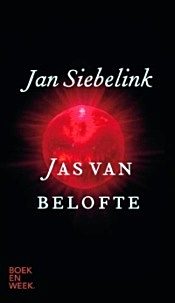 Op 31 maart, de laatste zondag van de Boekenweek, kunnen reizigers traditiegetrouw op het vertoon van het Boekenweekgeschenk gratis met de trein reizen.
Op 31 maart, de laatste zondag van de Boekenweek, kunnen reizigers traditiegetrouw op het vertoon van het Boekenweekgeschenk gratis met de trein reizen.
De moeder de vrouw
Het thema van de Boekenweek 2019 is ontleend aan het beroemde gedicht van Martinus Nijhoff ‘De moeder de vrouw’. Tevens is het Boekenweekthema een verwijzing naar de bundel De moeder de vrouw, met daarin twee romans (Ontaarde moeders en Mijn zoon heeft een seksleven en ik lees mijn moeder Roodkapje voor) over moederschap van de onlangs overleden Renate Dorrestein.
# meer informatie op website boekenweek
Boekweek 2019
van 23 – 31 maart
• fleursdumal.nl magazine
More in: - Book Lovers, - Book News, - Book Stories, - Bookstores, Art & Literature News, Boekenweek, Jan Siebelink, Nijhoff, Martinus
De schrijvers Jan Leyers, Ilja Leonard Pfeijffer en Jolande Withuis zijn genomineerd voor de E. du Perronprijs 2018. De prijs wordt toegekend aan schrijvers, kunstenaars of instellingen die met een cultuuruiting in brede zin een bijdrage leveren aan een inclusieve samenleving. De uitreiking vindt plaats op dinsdagavond 16 april in de Glazen Zaal in de LocHal in Tilburg. Dan houdt Gloria Wekker de achtste E. du Perronlezing.
 Jan Leyers ‒ Allah in Europa. Het reisverslag van een ongelovige (Uitgeverij Das Mag)
Jan Leyers ‒ Allah in Europa. Het reisverslag van een ongelovige (Uitgeverij Das Mag)
Leyers doet in dit boek verslag van een reis door Europa waarin hij op zoek gaat naar ‘een Europese versie van de islam’. Vier maanden lang wordt er gesproken met traditionele gelovigen en nieuwe bekeerlingen. Allah in Europa leest als een spannend verslag van gesprekken waarin verschillende denkbeelden tegen elkaar afgewogen worden. Knap is dat het boek nergens belerend of dwingend wordt, hoewel het overduidelijk een pleidooi is voor een open multicultureel Europa, dat de lezer aanzet tot nadenken.
 Ilja Leonard Pfeijffer ‒ Grand Hotel Europa (Uitgeverij De Arbeiderspers)
Ilja Leonard Pfeijffer ‒ Grand Hotel Europa (Uitgeverij De Arbeiderspers)
In deze roman neemt Pfeijffer ons mee naar een hotel ergens in Europa waarin zijn alter ego zich verschanst na een stukgelopen liefde. Het hotel is vergane glorie, oude geschiedenis en een metaforisch beeld voor het continent, waarvan de geschiedenis fenomenaal is, maar het heden op allerlei manier ontspoort: er is te veel consumentisme, geen engagement, er zijn geen nieuwe idealen. Pfeijffer verweeft verschillende verhaallijnen met elkaar, en is op zijn best in de essayistische passages waarin hij kritiek geeft op het hedendaagse Europa en vooral op het massatoerisme.
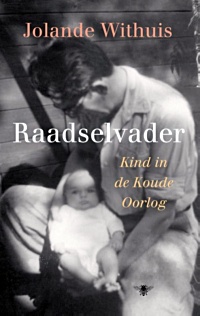 Jolande Withuis ‒ Raadselvader. Kind in de koude oorlog (Uitgeverij De Bezige Bij)
Jolande Withuis ‒ Raadselvader. Kind in de koude oorlog (Uitgeverij De Bezige Bij)
Withuis schreef een indringende biografie over haar vader Berry Withuis (1920-2009), die tegelijk een autobiografische reflectie biedt. De vader was communist en redacteur van de Waarheid. Haar communistische jeugd en de loyaliteit jegens haar ouders hebben Withuis geleerd dat er verschillende kanten zitten aan een historisch narratief. Noch het ontkennen van de slechte behandeling van communisten in Nederland tijdens de Koude Oorlog, noch het slachtofferisme van de zijde van communisten zelf, is de waarheid. Maar ook leert zij dat via het eigen verhaal de geschiedenis van anderen aanknopingspunten biedt en legt ze uit dat totalitaire overtuigingen mensen verleiden onmenselijke misdaden te begaan en het eigen ethische kompas uit te schakelen.
E. du Perronprijs
De E. du Perronprijs is een initiatief van de gemeente Tilburg, de Tilburg School of Humanities & Digital Sciences en Kunstloc Brabant. De prijs is bedoeld voor personen of instellingen die, net als schrijver Du Perron, grenzen signaleren en doorbreken die wederzijds begrip tussen verschillende bevolkingsgroepen in de weg staan. De prijs bestaat uit een geldbedrag van 2500 euro en een textielobject, ontworpen door studio ‘by aaaa’ (Moyra Besjes en Natasja Lauwers) en vervaardigd bij het TextielMuseum. In 2017 won Margot Vanderstraeten de prijs voor haar boek Mazzel tov. Andere laureaten waren onder meer Stefan Hertmans (2016), Ilja Leonard Pfeijffer (2015), Warna Oosterbaan & Theo Baart (2014), Mohammed Benzakour (2013), Koen Peeters (2012) en Ramsey Nasr (2011).
E. du Perronlezing
Professor dr. Gloria Wekker is emeritus hoogleraar Gender en Etniciteit aan de faculteit Geesteswetenschappen van de Universiteit Utrecht. Ze houdt, op 16 april, na Antjie Krog, Paul Scheffer, Job Cohen, Sheila Sitalsing, Herman van Rompuy, Arnon Grunberg en Marja Pruis de achtste E. du Perronlezing.
Voor het bijwonen van de uitreiking kunnen belangstellenden en genodigden zich aanmelden via www.kunstlocbrabant.nl/eduperron
Meer informatie over de prijs vindt u op: www.tilburguniversity.edu/duperronprijs
# Literaire prijzen
E. du Perronprijs 2018
Jan Leyers
Ilja Leonard Pfeijffer
Jolande Withuis
• fleursdumal.nl magazine
More in: - Book Lovers, - Book News, - Bookstores, Archive K-L, Archive O-P, Archive W-X, Art & Literature News, Awards & Prizes, Literary Events
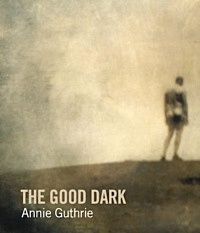 In the sequence of poems comprising Annie Guthrie’s first book, the quest for the meaning of human consciousness and its tangled subjectivity is drawn as a slow-building narrative of the mystic experience.
In the sequence of poems comprising Annie Guthrie’s first book, the quest for the meaning of human consciousness and its tangled subjectivity is drawn as a slow-building narrative of the mystic experience.
The journey enacted is that of the self as character, who encounters insurmountable mysteries in a breaking selfhood.
A dossier of contemplative exploration, THE GOOD DARK chronicles an immersive search in three acts: Unwitting, Chorus, and Body: stations through which the character must pass, and where she is accumulatively confessed, compounded and erased.
the gossip
I don’t always want what we have, she is saying.
Outside, dark clouds, fish hopping, tilling waves
back from shore. He is silent.
Sometimes more is happening, he says, finally.
The sun’s coming up, she says. Look how the light is kept.
I’d like to keep it up, he says.
Don’t make apart when otherwise the same, he says.
She is silent, tilling shore back from shore.
Don’t give darkness a face, he says, darkening.
Annie Guthrie is a writer and jeweler living in Tucson. She has a metalsmithing studio at Splinter Brothers Warehouse and can be found through her website, www.annieguthrie.net. She teaches at the University of Arizona Poetry Center and also mentors select students wishing to apprentice in poetry or to further their art projects through her courses in “Oracular Writing.”
The Good Dark
by Annie Guthrie
Paperback: 68 pages
Publisher: Tupelo Press, Inc.
2015
Language: English
ISBN-10: 1936797593
ISBN-13: 978-1936797592
Categories: Poetry
$16.95
# more poetry
The Good Dark
by Annie Guthrie
• fleursdumal.nl magazine
More in: - Bookstores, Archive G-H, Archive G-H, Art & Literature News
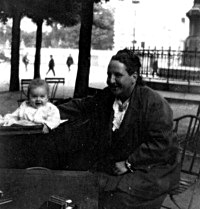
Mrs. Whitehead
But you like it.
They can’t any of them be quite as bad because they learned french but I never did.
He doesn’t look dead at all.
The wind might have blown him.
He comes from that direction. That’s the way.
They are not knotted. Have you smelt it. What would you suggest, your advice I have come across three or four.
So they are the others.
Separate them.
It does make one come, he is extraordinarily charming and endearing once of twice only twice I think.
He is not staying out that’s hard beside that what does he do.
That’s long for his mother.
She travelled from this rest. She crocheted from this nest.
She crocheted from this nest. I thought it wasn’t ever.
It’s one of my favorite ones this.
And yet not this.
Isn’t it funny.
It isn’t.
Break or breaking, very fair, break or very wanting.
I tried it this way before.
Very difficult to change extra places and yet I can agree. I can agree by that. I rest this piece of it and it’s nearly the same climate. I will tell you why they want a real door. They choose it.
They do so and very pure water. They are safe when they take a bath. Oh it is very. Oh it is.
In a way a vest.
I do think you get what you want.
Corrections.
It is eleven weeks from the middle of September. I glance in a way.
It is eleven weeks from the middle of September.
Total recollect others.
I glance at and I can recollect others. I make a division neatly, I close.
What is wrong with not blue. That is right with apples. Apples four. For. Fore.
Before that.
Next stretching.
Next for that leaf stretching.
I do not state leaf.
I like to beg very much stream.
Not exactly in state.
Understate.
All in so.
They expect all the blues to take of all the other families, the whites are extra they are beside all that, they make a little house and through and beside that they live in Paris.
Hardly enough for wood.
Not a color even.
By now a change of grass and wedding rings and all but the rest plan. I don’t care I won’t look.
I am not sure that yellow is good. I am tall.
Allow that. I don’t want any more out in conversation.
I can be careful.
Not within wearing it.
I cannot say to stay.
No please don’t get up.
And now that.
Yes I see.
Did you pay him for that whether for a spider and such splendor and indeed quitting. I meant to gather.
I see it I see it.
Please ocean spoke please Helen land please take it away.
I saw a spoken leave leaf and flowers made vegetables and foliage in soil. I saw representative mistakes and glass cups, I saw a whole appearance of respectable refugees, I did not ask actors I asked pearls, I did not choose to ask trains, I was satisfied with celebrated ransoms. I cannot deny Bertie Henschel is coming tomorrow. Saturdays are even. There is a regular principle, if you mention it you mention what happened.
What do you make of it.
You exceed all hope and all praise.
Stein, Gertrude
(1874-1946)
Mrs. Whitehead
fleursdumal.nl magazine
More in: Archive S-T, Archive S-T, Gertrude Stein, Stein, Gertrude
DEATH TO THE FASCIST INSECT is a compilation of the writings and transcribed recordings of the Symbionese Liberation Army (1973–75), a radical left-wing group based in the Bay Area of California. This publication chronicles the militant, if half-baked, political theories that inspired the SLA, as well as the ways that the SLA used violence and manipulation of the media to further the group’s goal of provoking armed revolution from the underground.
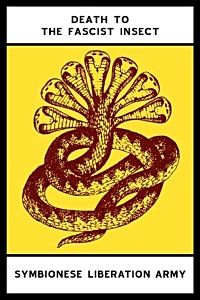 Founded by escaped convict Donald DeFreeze, aka Field Marshal Cinque, the SLA was mostly composed of young, largely white and middle-class men and women, whose stated aim was to destroy all forms of racism, sexism, and capitalism. One of the SLA’s first acts was the murder of the Oakland superintendent of schools; SLA members went on to kidnap newspaper heiress Patricia Hearst, demand millions of dollars from her wealthy family for free food for “people in need,” and rob a bank in San Francisco with Hearst. Most of the SLA, including DeFreeze, died in a fire after a gun battle with police in Los Angeles, while Hearst was later pardoned.
Founded by escaped convict Donald DeFreeze, aka Field Marshal Cinque, the SLA was mostly composed of young, largely white and middle-class men and women, whose stated aim was to destroy all forms of racism, sexism, and capitalism. One of the SLA’s first acts was the murder of the Oakland superintendent of schools; SLA members went on to kidnap newspaper heiress Patricia Hearst, demand millions of dollars from her wealthy family for free food for “people in need,” and rob a bank in San Francisco with Hearst. Most of the SLA, including DeFreeze, died in a fire after a gun battle with police in Los Angeles, while Hearst was later pardoned.
This publication features an introduction by editor John Brian King, a chronology of the SLA, the writings and transcribed recordings of the group presented in the context of events at the time, and a fifty-page appendix of notable articles, letters, and other texts related to the SLA.
John Brian King is a writer, photographer, and filmmaker. His works include the nonfiction book Lustmord: The Writings and Artifacts of Murderers (1997), the photography books LAX: Photographs of Los Angeles 1980-84 (2015) and Nude Reagan (2016), and the feature film Redlands (2014).
Death to the Fascist Insect
John Brian King, Editor
Publisher: Spurl Editions
Product Number: 9781943679089
ISBN 978-1-943679-08-9
SKU #: C17B
Binding: Paperback
Pages: 232
Literary Nonfiction
California Interest
African & African American Studies
Political Theory. Crime
Price: $ 18.50
Pub Date: 3/13/2019
# New books
SLA – Symbionese Liberation Army
Death to the Fascist Insect
• fleursdumal.nl magazine
More in: - Book News, - Bookstores, Archive K-L, Art & Literature News, CRIME & PUNISHMENT, Racism
Thank you for reading Fleurs du Mal - magazine for art & literature